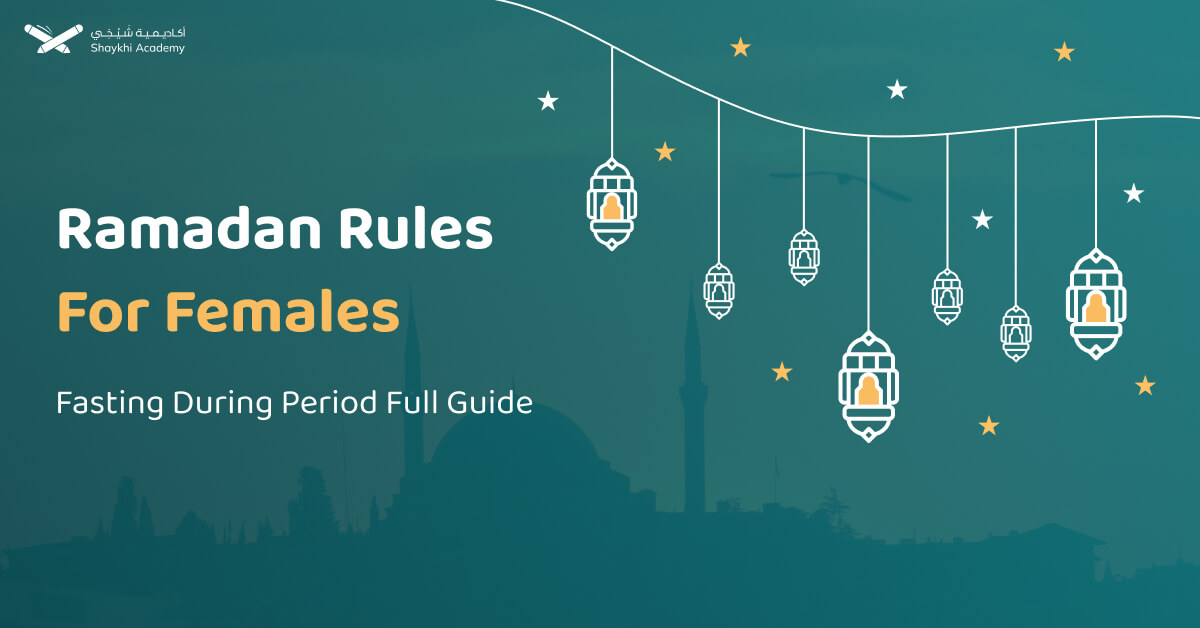Ramadan Rules For Females are dealt with special cases in Islamic Law. As Women in Islam hold a very unique place. Hence, Islamic legislation takes into consideration the physical and emotional well-being of females.
In this article, we will shed light on Ramadan rules for females apart from the Ramadan Closing rules for females, explaining some of the most important Islamic rulings for women, Ramadan period rules, and some tips on how to manage your time during Ramadan.
In a nutshell: During menstruation, fasting is not permissible, and any fast observed while menstruating is considered invalid. Similarly, if one begins menstruating during the day, fasting must be discontinued immediately. It’s imperative to make up for missed fasts after Ramadan.
For pregnant and lactating women, fasting during Ramadan is optional, and the decision should be made based on individual health considerations. Despite being unable to fast during menstruation, there are numerous other acts of worship women can engage in during Ramadan, such as supplication, charity, and preparing iftar meals. Additionally, attending online Islamic classes for sisters can enhance spiritual growth and knowledge.
What Are Ramadan Rules for Females?
Ramadan rules for females are all the regulations, orders, and prohibitions that specifically apply to women during the month of Ramadan. These regulations include menstruation rules, pregnancy and lactation rules, and other rules that concern Muslim women during the sacred month.
Ramadan Menstruation Rulings
You might be asking, can I fast on my period during Ramadan? What shall I do if I get my period during the day or night of Ramadan? And how to make up for the missed days? Now let us briefly answer these questions.
Should I Break My Fast if I Get My Period?
Yes, if you are already fasting and you got your period at any time before sunset you should discontinue your fasting. In this case, this day doesn’t count and you will need to make up for it after Ramadan.
Should I Continue Fasting if I Get My Period?
No, you should break your fasting if you get your period during the day of Ramadan; since menstrual bleeding and postpartum bleeding make your fasting invalid even if it is seen one minute before sunset.
Why is it Haram to Fast on Your Period?
As a Muslim woman, you should totally submit to Allah’s will. Hence, you are not rewarded for fasting while you are on your period. On the contrary, in this case, you are considered disobedient to Allah Subhanahu Wa Ta’ala.
Moreover, pious Muslims should accept the permission of Allah the creator, and the All-knowing, Who loves his permission to be practiced. As narrated in the Hadith by Ibn ‘Umar: Allah’s Messenger said: “Allah the Most High loves that His permissions be practiced, just as he dislikes that disobedience to Him be committed.”
What if I Got My Period On the Night of Ramadan?
In case you had your period on the night of Ramadan or at any time between sunset and Al-Fajr of the next day, you should refrain from fasting starting from the next day till you see the sign of purity. Then you should make up for these days after Ramadan.
Ramadan Rules During Pregnancy and Lactation
Allah gave permission for pregnant and lactating females not to fast during Ramadan while making up for these days after Ramadan when they are able to. This is in case there is any potential harm that may affect the health of the mother or her baby. The risks and benefits of fasting should be evaluated by the healthcare professionals before deciding whether to fast or not.
Although some recent studies showed that fasting has no effect on the birth weight of newborn babies, the decision of whether to fast or not during pregnancy should be personalized according to how your pregnancy is going, your general health condition, the stage of pregnancy, as well as the presence of comorbid factors. Therefore, it is recommended to consult your healthcare provider or midwife before you decide.
The same applies during lactation, it is always essential to ask your breastfeeding consultant if it is safe for you and your baby to fast during Ramadan or not.
In both scenarios, if you make the decision to fast, it is recommended to keep a healthy diet, not to skip the Suhoor meal, and to drink plenty of water in order to get the energy you need and to watch out for the signs of dehydration during fasting.
How to make up for your Missed days For female?
If you have missed some days during Ramadan with an excuse such as menstruation, pregnancy or lactation, you should write down the number of days you missed so that you don’t forget.
Then after Ramadan when you can fast, you can make up for these days either separately or consecutively.
Tasting Food While Fasting in Islam
Tasting food while fasting is permissible in Islam under certain conditions, particularly when there is a genuine need. This may include situations where a person, such as a cook or a mother preparing meals for her family, needs to check the seasoning or quality of the food. However, it is essential to ensure that nothing is intentionally swallowed. The person must only taste the food by placing it on the tongue and then spitting it out completely, without allowing any part of it to enter the throat or stomach.
Scholars emphasize that if any portion of the tasted food is swallowed deliberately, the fast becomes invalid, and the person must make up for that day later (qada). Therefore, caution is advised to avoid breaking the fast unintentionally. It is always better to minimize tasting unless absolutely necessary. This ruling reflects Islam’s balance between religious observance and practical needs, ensuring that fasting remains a spiritually fulfilling act while accommodating necessary circumstances.
May Allah accept our fasting and good deeds. Peace and blessings be upon our beloved Prophet Muhammad, and all praise is due to Allah, the Lord of all worlds.
How to Manage Your Day in Ramadan For Females?
The month of Ramadan is considered one of the most blessed months of the year. However, it may be challenging for Muslim women to balance their day-to-day duties and the acts of worship they wish to perform during the Holy month. Here are some tips and tricks that might help busy moms manage their day during Ramadan.
Read more about: CAN I LEARN THE QURAN WHILE ON MY PERIOD?
Tips and Tricks For Busy Moms During Ramadan
As a mother, you might feel overwhelmed with daily duties, especially during the month of Ramadan when you are responsible for taking care of the kids, tidying up your home, fulfilling the needs of each and every member of your family, preparing Iftar and Suhoor meals every day, in addition to performing worships. This task is not an easy one, especially if you are a working mother.
Let us set an optimal plan to efficiently manage your daily tasks; so that you can benefit the most from your time in Ramadan.
1. Keep away from distractions
Ramadan is a golden chance to gain extra rewards for your good deeds. Therefore, you should be focused so that you benefit the most and avoid all sorts of distractions that may waste this precious time, such as spending too much time watching TV, shopping, or scrolling the Internet.
2. Avoid extravagance in the preparation of Iftar meals
Preparing excessive amounts of food during Ramadan not only contradicts the purpose of fasting but also wastes the precious moments of the holy month of Ramadan.
3. Pre-plan some activities to make your kids busy during Ramadan
By planning some fun activities for your kids during Ramadan, you will ensure that they keep engaged, and help them learn the virtues of the holy month. In addition to creating lasting memories of these special days.
For instance, You can let your kids help you decorate the house before Ramadan, read Ramadan stories for kids and make some arts and crafts to give out as gifts for their friends and family members. Additionally, you can let them accompany you to the Taraweeh prayers.
4. Use a daily planner and a to-do list to organize your day in Ramadan
One of the most efficient ways to organize your day during Ramadan is by writing daily action plans. This will help you remember the important tasks that you should do every day so that you do not procrastinate or feel overwhelmed with your daily tasks. You can also encourage your kids to plan their daily activities during Ramadan using a weekly checklist and rewarding them for completing their tasks.
Download our free printable weekly Ramadan checklist for kids now!
Unlock the Path to Quranic Mastery with Shaykhi Academy!
Are you seeking the finest Quranic education right from the comfort of your home? Look no further! Shaykhi Academy stands out as a premier online Quran learning platform, dedicated to providing exemplary education to both children and adults.
Why Choose Shaykhi Academy?
- Connect with highly qualified native tutors.
- Flexible scheduling to suit your busy lifestyle.
- Affordable classes tailored for all levels.
- Accessible from anywhere around the globe.
Discover Our Range of Courses:
- Arabic Noorani Qaida: Lay a solid foundation for Quranic studies.
- Online Quran Classes for Kids: Engaging lessons for lifelong learning.
- Tajweed Rules for Kids: Learn to recite with confidence.
- Quran Hifz for Kids: Step-by-step guidance to memorize the Quran.
- Quran for Adults: Introduce yourself to Quran reading and Tajweed rules.
- Online Arabic Courses: Master the language of the Quran.
- Islamic Studies: A wide range of topics related to Islam, including theology, law, Quranic studies, Hadith.
Don’t Miss Out on Your Chance to Excel!
Whether you’re a beginner or seeking advanced knowledge, Shaykhi Academy can guide you! Book your free trial now and make Ramadan 2024 your Quranic turning point!

Conclusion
Ramadan rules for females are set to ensure the well-being of Muslim females. Although fasting and prayers are forbidden for females in some conditions during Ramadan such as during menstruation and postpartum periods, yet there are a lot of good deeds that you can do to be one of the winners in Ramadan, become closer to Allah and achieve his forgiveness and rewards.
While fasting may not always be feasible during certain periods, there are numerous alternative ways to engage in worship and maintain a spiritual connection throughout Ramadan. Seeking knowledge through online Islamic classes, engaging in acts of worship such as supplication and charity, and prioritizing health by consulting healthcare professionals are crucial steps for women during this sacred month. Additionally, planning activities for children, optimizing time management, and offering iftar meals to others are practical ways to actively participate in Ramadan’s communal spirit. By implementing these action items, women can navigate Ramadan with mindfulness, spirituality, and a sense of community, regardless of their fasting status.

















































